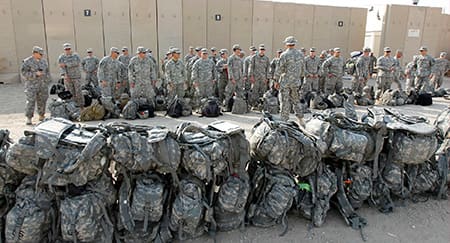The 'shellacking' that Obama's Democrats took at the mid-term elections was not just about jobs at home, argues Professor Michael Cox. It is also about America's place in global issues and how American values were supported - but the electorate didn't seem to like the news on this front either.
Political parties who control the White House rarely if ever do well at mid-terms.
Indeed, unless jobs are in plentiful supply and real estate prices are on their way up – two conditions which obviously do not pertain at the moment – then there is every chance the majority party will do quite badly.
Clinton as always was the exception to this particular law of politics. In 1994, everybody felt good materially. But the electorate punished him at the polls. Still, the unspoken rule seems to be that if one does not suffer a political rout at mid-term, one can claim a draw and prepare to fight for the next, most important, election of all: the critical one to keep control of the Executive.
Mid-terms are invariably fought on domestic issues
It is also one of the axioms of US politics that mid-terms are invariably fought on domestic issues: obviously the state of the economy; more often than not the character of the President himself; and of course his achievements during the previous two years in office.
In the United States you also can also add in at least three other items in 2010: immigration, health care reform, and homeland security. All are 'stay at home' issues.
Yet it would be wrong to think that foreign policy and international issues have not played a role.
True, there has been no Bush-like rhetoric about a ‘war on terror', of missions accomplished, and America the exceptional standing between the world and chaos. In fact, the world almost seems to have disappeared entirely over the past few months with barely a mention of NATO, hardly anything on development, virtually nothing on climate change, and only a passing nod to recent events in the European Union – the least discussed overseas issue in any American election.
But the world will not go away and ordinary Americans appear to sense this. They might not understand the complexities of globalisation, be much interested in international relations, or read 'Foreign Affairs'. But they know they are part of something much bigger.
The only problem is – they don’t much like what they’ve been hearing of late.
Until the economic crisis of 2008, China was mainly a liberal issue, with Tibet and human rights figuring high. Now it is deep down and material.
First there is China: booming, rising, crisis-free China with its 'unfair' trade practices, undervalued currency, and vast reservoirs of controlled cheap labour taking away American jobs and luring US capital across the Pacific. Until the economic crisis of 2008, China was mainly (though not only) a liberal issue with Tibet and human rights figuring high. Now it is deep down and material.
China, it is now oft repeated on Fox News and the many conservative TV channels, is not just “eating my lunch” but is eating my children’s too. And something ought to be done to stop the rot. The likely long-term consequence? Increasing pressure on the administration to take a tougher stand on China with all sorts of consequences in Asia and possibly the world.
Second, there is immigration – never a purely domestic issue in a nation which has claimed some sort of rights south of the Rio Grande since the Monroe Doctrine was first promulgated in 1823. Now the situation is getting serious, in large part because of the crisis and the appallingly tough job market in key swing states where there also happen (by coincidence) to be a very large number of ‘Latinos’.
But the issue is not only about jobs.
It is also about a sense of identity and the notion of sovereignty; and the strong and bitter feeling amongst many Americans – invariably blue collar - is that America can no longer control its borders, a palpable symptom, surely, of a nation in decline.
Finally, there are those many unfinished wars in far away places where since 2001 over 5000 Americans have been killed and tens of thousands wounded and maimed by what they see as a ruthless Islamist (even Islamic) enemy hell bent on destroying Israel – still very popular amongst voters – not to mention that ill-defined but deeply important notion for most Americans: their way of life.
Europeans overwhelmingly simply don’t understand (or more specifically don’t like) this side of the United States; that side which stands for the flag, sings the national anthem, celebrates its military, endorses the values the military embody, and continues to believe in traditional notions of valour and honour. These were once European values too: but for good reason we decided to abandon them after two devastating wars in the 20th century showed us where they might lead.
The business of government has to go on; and we might be reassured to know that US foreign policy is not going to be determined by populists who feel they have to reclaim the country from those they believe have captured it for some nefarious purpose
Yet, if we want to understand why so many Americans are angry – with their politicians, their Commander-in Chief, with Muslims, and sometimes even with what they regard as their own pusillanimous allies in NATO - it is essential to understand this profoundly important aspect of the American psyche.
It is in part animating the so-called Tea Party insurgency. It is why many Americans oppose the building of a mosque near ‘ground zero’ in New York. And it is one of the major reasons why so many of them would appear to have grave doubts about that ‘egg-head’, Obama.
There is no necessary connection of course between being a patriotic American, supporting the US military in Afghanistan and thinking Obama might not be a true American. There is however a connection between the more extreme forms of ‘Americanism’ – which is in plentiful supply in these disturbed times – and thinking the world is a hostile place and that most foreigners (especially those of the non-European variety) are out to do the United States down.
Still, the business of government has to go on; and we might be reassured to know that the foreign policy of the United States is not going to be determined by the populist views of those who feel they have a duty to reclaim the country from those they believe have captured it for some nefarious purpose.
However, it does make having an informed, open, and civilized debate about serious foreign policy options that much more difficult – especially when one of the major political parties (and here I am referring to the Republicans) is always having to look over its shoulder to make sure that it is not losing or alienating its radical base.
With a world that is merely getting by at the moment, and in some cases teetering on the edge of major crisis, it is less than reassuring to know that the last, indeed the only great superpower in the world, is bitterly divided against itself at a time when it never needed to be more united.



